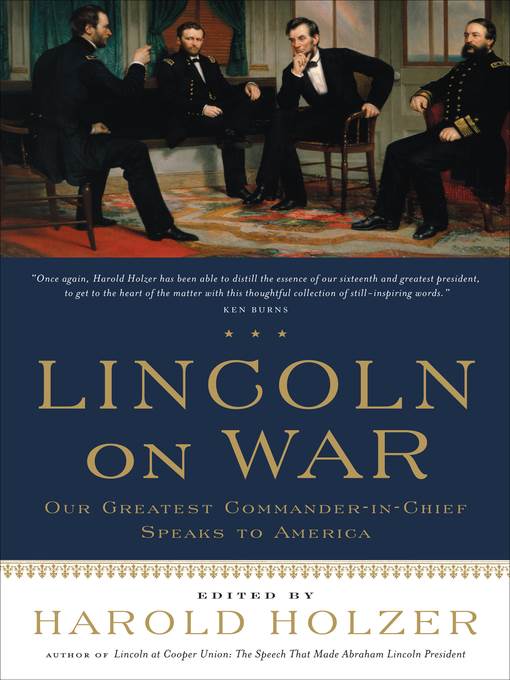
Lincoln on War
Our Greatest Commander-in-Chief Speaks to America
کتاب های مرتبط
- اطلاعات
- نقد و بررسی
- دیدگاه کاربران
نقد و بررسی

Starred review from April 25, 2011
Lincoln scholar Holzer assembles a valuable collection of letters, speeches, and casual observations of 16th president on the nature of war and the battles that defined his presidency. Dating from the years of Lincoln's brief military service to the day of his assassination, many of Lincoln's commentaries continue to resonate today. As a congressman, Lincoln was a passionate opponent of the Mexican-American War and chided President James Polk for not having an exit strategy and his unilateral decision making. However, the Civil War forced Lincoln to make the same sort of autocratic decisions that he had once criticized; he did not hesitate, for instance, to suspend the writ of habeas corpus. Lincoln had a sophisticated understanding of military strategy and his well-known exasperation with Gen. George McClellan is on full display here, as McClellan's avoidance of battle eventually forced Lincoln to relieve him of duty. Holzer does a splendid job of introducing and explaining texts, particularly those involving slavery. Lincoln shrewdly used emancipation as both a political and military tool before fully developing his plan to recruit African-Americans into the war effort. This compact and powerful volume is a dramatic account of the most decisive conflict in the American history in the words of its principal architect, and is long overdue. Photos.

January 1, 2011
One of the world's foremost Lincoln scholars offers a selection of the president's writings and remarks on war, its conduct, trials, horror and meaning.
From his inauguration to his assassination, Lincoln fulfilled the role of commander in chief so skillfully as to become a model for succeeding presidents—reason enough, Holzer (Lincoln and New York, 2009, etc.) argues, to understand clearly the Lincoln record. For this project's purposes, the author divides the president's career into three parts: the young Lincoln, a period that included his brief, volunteer captaincy during the Black Hawk War and his stint as a dovish Congressman opposed to the Mexican War; the presidency from 1861 to '62, during which Lincoln struggled to master warfare's tools and tactics, to govern his military and civilian subordinates and to shape public opinion; and the war's final years, when the slaughter only increased before Lincoln's will and wisdom finally prevailed. From speeches and letters (sent and unsent), grand declarations, official messages and proclamations, orders, telegrams and instructions, hasty memoranda, informal notes and revealing private comments, Holzer assembles the president's thinking on war, prefacing each selection with helpful remarks providing necessary context. Some of these documents are famous—e.g., the Gettysburg Address—while others are obscure. Some contain deathless rhetoric since memorized by all Americans, while some are merely homespun words (e.g., his battle advice to U.S. Grant: "Hold on with a bulldog gripe [sic] and chew & choke, as much as possible") that demonstrate simultaneously Lincoln's untutored prairie origins, his talent for the arresting phrase and his military resolve. All combine to illustrate the Holzer's thesis that Lincoln, without ever taking the field, waged war with "the most powerful weapon at his disposal: his pen."
A wisely chosen, expertly arranged collection.
(COPYRIGHT (2011) KIRKUS REVIEWS/NIELSEN BUSINESS MEDIA, INC. ALL RIGHTS RESERVED.)

Starred review from March 1, 2011
Holzer's selection of Lincoln's speeches, letters, memoranda, telegrams, orders, and private statements on war reveal a president much interested in war and not afraid of it, a leader who was at once farsighted and often practical. Lincoln grasped the importance of grand strategy, became an excellent judge of military men, and remained open to new ideas. In Holzer's estimation, these writings deserve attention because words were essential for galvanizing support for the Union cause, for emancipation, and for communicating effectively to insure coordinated military action. Lincoln gave people substantive and even soaring reasons to fight and die for the Union, democratic government, and "a new birth of freedom." As relevant today as during America's "ordeal by fire" and highly recommended to all interested readers.
Copyright 2011 Library Journal, LLC Used with permission.

























دیدگاه کاربران